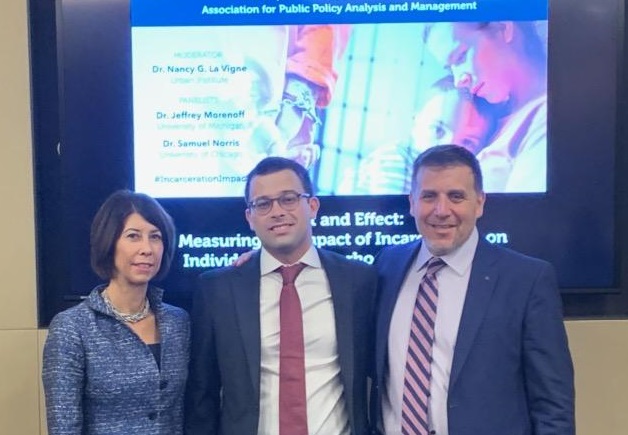
Crime, the saying goes, does not pay. Yet neither does incarceration, according to research presented by Dr. Jeffrey Morenoff (U. of Michigan) and Dr. Sam Norris (U. Chicago) at a recent congressional briefing. The briefing, “Cost and Effect: Measuring the Impact of Incarceration on Individuals, Neighborhoods and Society,” took place before a standing-room-only crowd on October 10, 2019, and was moderated by Nancy G. La Vigne, a national expert on criminal justice at the Urban Institute.
Morenoff, who recently served on the PAA Board and currently serves as an officer for the Association of Population Centers (APC), conducted extensive research on the pathways to reentry from prison back into society, drawn from a cohort of 11,000 formerly incarcerated individuals in the Michigan criminal justice system. With evidence compiled from administrative data along with in-depth interviews and longitudinal tracking of a sample of individuals as they progressed through the reintegration process, Morenoff showed how family ties, administrative burden (including fees associated with parole and minor infractions), and housing and economic instability exerted pressures that could help or hinder reintegration. This evidence is also detailed in a book co-authored by Morenoff and released this year, On the Outside: Prisoner Reentry and Reintegration.
Dr. Sam Norris, an economist from the University of Chicago, began the briefing with an overview of the cost and benefit ratios associated with incarceration, using data from the State of Ohio. He concluded that while incarceration can provide temporary relief from criminal activity in the short run, over time the beneficial effects of incarceration did not persist, and the costs associated with incarceration nearly outweigh the overall benefits. The policy implications of both presentations point to opportunities to reexamine the types of investments we make in the criminal justice system.
The briefing was jointly sponsored by the Population Association of America and APPAM. Dr. Morenoff presented at the behest of PAA, while Dr. Norris represented APPAM. Morenoff’s research was funded by the Eunice Kennedy Shriver National Institute of Child Health and Human Development (NICHD), the National Science Foundation and the National Institute of Justice (NIJ). Dr. Norris’ research was also supported by the NIJ. View the speaker slides.